Meet the kids who code and their mentor Shweta Mukesh who is taking them places
The brainchild of Shweta Mukesh and her team, KidsWhoKode is prepping young kids in Bengaluru to become future leaders in technology by teaching them different coding languages.
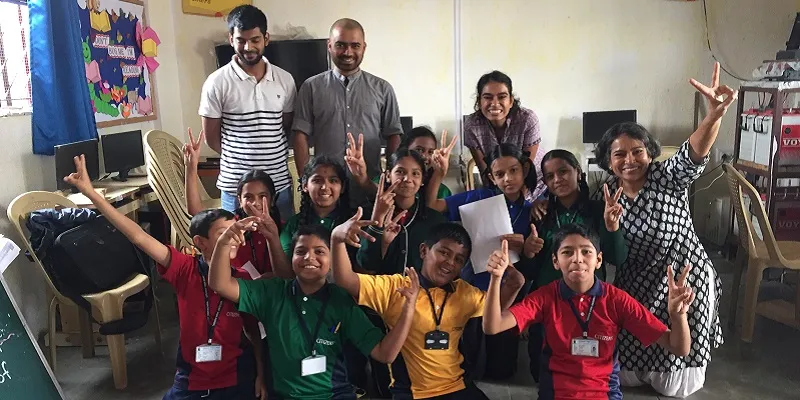
Eleven-year-old Nowfal is excited to talk about his new colourful and quirky computer game. His eyes light up as he talks about how the game was coded..
While I am trying to grapple with the language that sounds all Greek to me, he plays a demo game, and clears level 1 of ‘RANFA Save Life’, before I can even say ‘code’. He looks up, smiles at me and says “We are yet to complete writing the code for level 2”.
Nowfan is among the 20 children from Citizen’s High School in Richards Town, Bengaluru who for the past three months have embarked on a journey of learning how to code.
Even as I walk past various teams of children who insist I try playing the games they have built, I can’t help but be in awe and admiration of their intellect, enthusiasm and efforts.
The core of the coding idea
Shweta grew up in the US and would often come to India for the summer holidays. Most of her days were spent teaching math and English to under-privileged children in the slums of Bengaluru.
The 27-year-old recalls those days with a glint in her eyes. "The learning experiences I had in India were in stark contrast to my school days in the US. That’s when I was clear I wanted to do something in the development sector".
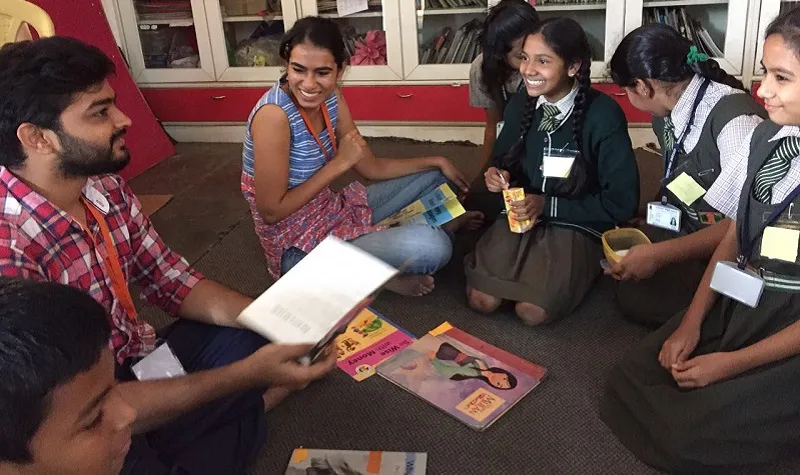
Shweta moved back to India at the age of 20 to take up her first job in the policy innovation sector at a development consultancy. Among the major learnings that she experienced while holding several corporate jobs was the releasation that technological advancements (like robotics and artificial intelligence) were soon disrupting every sector.
I realised how it was inevitable for today’s children to catch up on technology if they were to become future change makers. That’s when I began to explore several coding initiatives for children. I was surprised to find that there was a lack of such initiatives in the non-profit space, says Shweta, who founded KidsWhoKode last November along with her colleagues Mani Kandan and Sanjeev Reddy.
The language of the future
Intitially launched as a pilot project, the initiative has targeted 20 selected children from the Citizen’s High School in Bengaluru. Divided into two batches, from Grade IV-VI and Grade VII-IX, these children are now writing codes for different projects that includes building video games, websites, calculators, quizzes, and more.
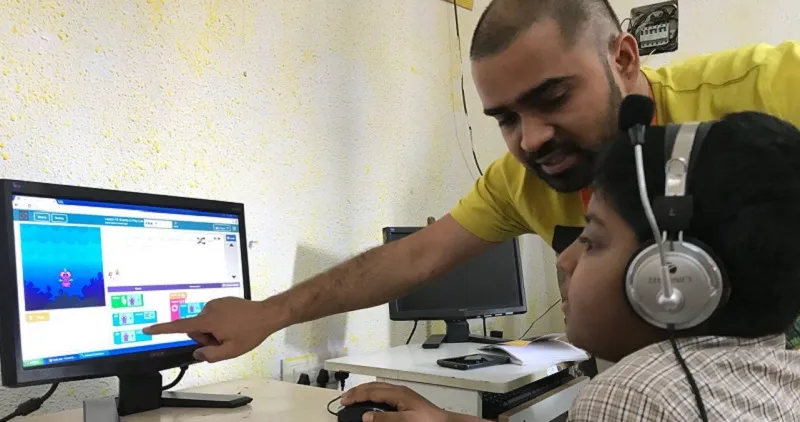
Shweta and her team firmly believe: ‘Ability is evenly distributed. Exposure and opportunity is not.’ “With technology being at the forefront of innovation, we hope to bridge this gap. KidsWhoKode works with low-income, high potential students to build curiosity in technology, to learn the basics of coding, and to become leaders in tech,” says Shweta, who now heads business operations at Belong, a startup working in outbound hiring services.
She also elaborates on why children need to get cracking on coding at an early age.
It teaches the foundation and ability to think early on. Young children also grasp language faster and coding helps them in academincs, apart from sharpening their problem-solving, critical thinking and organisational skills.
A process-driven initiative
Having partnered with an affordable private schools like Citizen’s High School, KidsWhoKode leverages their facilities to train students in an engaging three-month programme that provides personalised learning to every student. Currently Shweta and her team are bearing fifty percent of all infrastructure costs that include laptops, internet connection, downloading coding software, etc… the regular weekend teaching sessions.
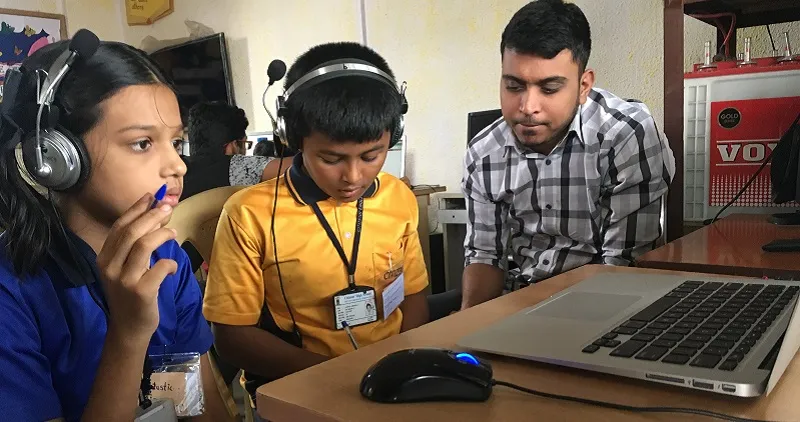
The teaching, learning and follow-ups are all facilitated and monitored by a group of volunteers (mostly from Tier 1 colleges now working at premier technology companies). Twenty-fouryear-old Vivek Kartheek is one such volunteer who teaches different coding languages to kids. When asked what keeps him hooked to work as a facilitator with KidsWhoKode, he says:
As I teach the kids, I’m also re-learning the nuances of coding that I had earlier taken for granted.
Choosing to move away from the NGO tag, KidsWhoKode, instead say “they are a ‘for-purpose’ organisation run with a social heart and a business mind”. They have a well-rounded core team of people with varied skill sets from the fields of business, operations, education etc…has helped KidsWhoKode to keep their functions extremely process-driven that includes template lesson plans, checklists, and regular feedback collection.
Coding is no easy task
When I question fifth-grader Ameena if she enjoys coding, she smiles and nods her head in agreement. She adds, “it’s not very easy though”.
For Rahul in the 7-9th batch though, the most challenging part about coding is cracking for loops and nested loops.
Facilitator Shuchi has been training the Grade VII-IX batch of students since the start of the programme. "Sometimes the kids have so many questions that it takes a while for me to efficiently answer them all. It’s phenomenal how quickly the children have picked up professional coding languages in such a short span of time", she says.
Though facilitators mostly use interactive content created by Code.org (a pioneering American website), the lesson plans for the VII-IXth graders had to be mostly customised.
“However we conducted several activities that taught them the value of persistence and decomposing (breaking down bigger problems) to help them to code better without losing their patience or attention span,” Shuchi adds.
Our early challenges were, Shweta says, maintaining the regular attendance and engagement of facilitators, adequate infrastructure, and modifying content when the children struggled with foundational maths.
Nursing big dreams
Shweta’s mother Purna Mukesh, a veteran teacher (also part of its core founding team) has also helped KidsWhoKode in its journey of empowering young children. “As she is an educator, she connects with kids a lot better,” shares Shwetha, adding “her mother adds a lot credibility to what they do.”
Shweta is also keen to ensure that KidsWhoKode develops to work as a sustaining model in the days to come. “Early thoughts is to train our students to teach other students so that it becomes a student driven movement. Simultaneously we will do continuous training. We would eventually like to integrate it into school curriculums and use it as an opportunity to get computer labs in Tier 1 cities that children can easily access.”
A recent industrial visit to Bempu, an organisation that has designed neonatal hypothermia monitoring bracelets, has inspired many like Nowfal, who has now understood the importance of coding and its implications for change.
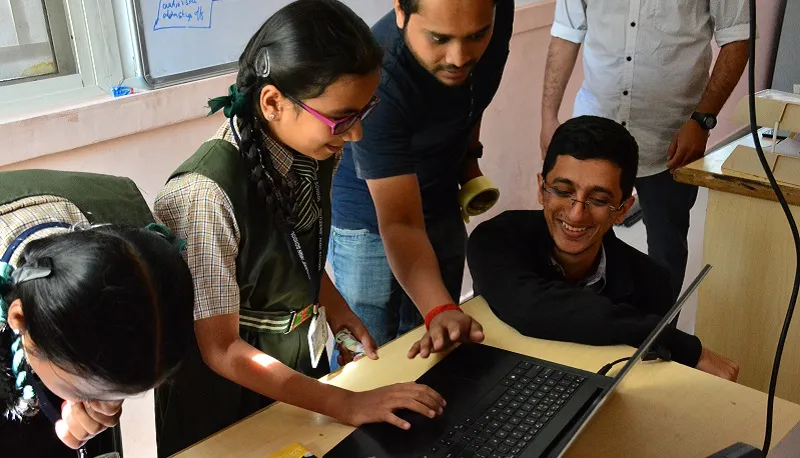
Seventh-grader Rahul who is working on his HTML coding sheet tells me that he“aspires to be a scientist and develop creative robots to help doctors in the future.”
“The speed and enthusiasm with which the children are learning to code is what keeps us going,” Shweta says, as she signs off.







